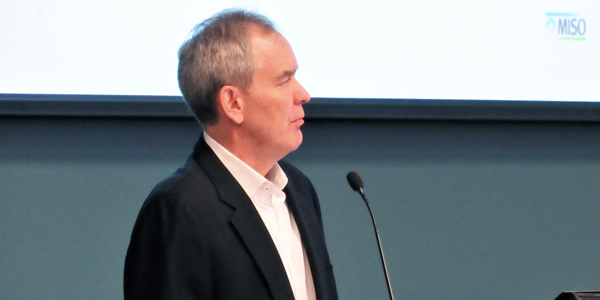By Amanda Durish Cook
MISO last week outlined the range of stakeholder feedback it has received since revealing its straw proposal for energy storage resources (ESRs) in June.
The RTO’s proposal for complying with FERC Order 841 called for ESRs participating under four modes of commitment: charging, discharging, continuous operations and outage/offline. When in online mode, storage would be treated as must-run resources. (See MISO Offers Straw Storage Proposal to Meet Order 841.)
At a July 12 Market Subcommittee meeting, MISO said that stakeholders have stressed the importance of coordination with distribution system providers and expressed concern that requiring hourly offers might limit storage’s flexibility. Others reminded the RTO that storage resources are not generation and said they should not be bound to a must-offer requirement. Some said storage should be treated like load-modifying resources while others said storage should be restricted to the ancillary services market, despite FERC’s requirement that it be allowed to provide capacity and energy.
Stakeholders asked how hybrid storage-and-renewable formats will fit under the proposal and requested optimized pumping and withdrawal options for pumped storage facilities. MISO dismissed the latter as beyond the scope of Order 841 but said it will meet with market participants to discuss ways to fully incorporate pumped storage into the market.
MISO Director of Market Design Kevin Vannoy said the RTO would return in August with more detail around the proposal and examples of how storage will function under the model. It will focus examples on non-market services, storage modeling, metering, commitment and dispatch rules, Vannoy said. Market clearing prices or LMPs will set emergency pricing for injecting and withdrawing during maximum generation events.
“There might be restoration payments when energy storage resources provide black start restoration from an event,” he added.
MISO also said it will rely on its existing ramp performance measures — excessive and deficient energy flagging and deployment failure penalties — to evaluate storage performance.
Vannoy said he’s gotten at least two requests for private meetings with MISO staff to discuss the straw proposal. While MISO isn’t opposed to setting up one-on-one meetings, he said, staff are busy working on Order 841 compliance and have limited time. He also said it may be best to raise storage issues and suggestions in public meetings.
“We’re not necessarily looking to facilitate private discussions,” Vannoy said, urging stakeholders to bring their storage questions and recommendations to the Resource Adequacy, Market and Reliability subcommittees.
Vannoy said while MISO usually doesn’t solicit extensive stakeholder feedback on FERC compliance directives, Order 841 compliance is a “special case” that warrants more intensive stakeholder involvement, and MISO plans to collect more feedback through summer.
“I don’t think this is a pure vanilla compliance filing. It’s not where FERC says, ‘Do A, B and C,’ and we file A, B and C,” Vannoy said.
MISO will solicit feedback through fall while presenting more refined versions of the plan. It plans to have a draft compliance plan by mid-October. Its Tariff filing is due in December.
Storage Model on Old Platform
MISO plans to implement its new storage participation model before it replaces its current market platform with a more sophisticated modular system. Responding to the straw proposal, stakeholders asked that the RTO not make a storage participation model dependent on the new platform’s capabilities. Instead, they asked that MISO design the market platform with storage needs in mind.
Kevin Larson, MISO market and modeling director, said the RTO will continue to assess principal vendor General Electric’s performance on project deliverables and will evaluate alternate vendors through the end of 2019. MISO last month said GE was overly optimistic in its original timeline for the replacement, which may lead to delays and a small budget overrun. (See MISO Platform Replacement Risks Delay, Budget Overrun.)
“We’re in an evaluation phase with General Electric,” Larson said.
MISO reported in June that, as part of its multiyear market platform replacement, it had improved its day-ahead solve time by more than six minutes, about a 10% improvement. Larson said the additional headroom will allow for “select market enhancements while the new market system is being developed.”
Storage Capacity Accreditation
At the July 11 RASC meeting, MISO presented its proposal on how it will accredit storage capacity, another requirement of Order 841.
Senior Adviser of Capacity Market Administration Rick Kim said MISO is proposing to require that storage resources continuously discharge energy equivalent to their zonal resource credits committed in the Planning Resource Auction.
The continuous discharge would be subject to a minimum run time, either 24 hours or four hours for limited-use resources. Storage resources would also have to submit the generator verification test capacity (GVTC) data required of other planning resources. MISO would ask for a storage resource’s GVTC by Oct. 31, 2019, for the 2020/21 planning year capacity auction. The RTO said it would also want storage resources to provide documents to support the megawatt-hours of capacity they claim. MISO will apply default outage rates to determine unforced capacity calculations for storage resources that have less than a year of operational data.
Storage assets should also secure either firm transmission service or network resource interconnection service before offering as a capacity resource. If the storage resource is interconnected at the distribution level, the resource will be subject to coordination with the distribution provider, transmission owner and MISO.
Kim asked stakeholders for specific ideas on the calculations and tests for capacity accreditation.




